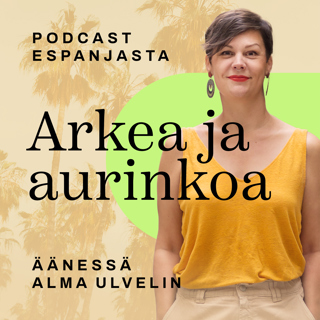
IELTS Energy 42: How to Get that 7 For Vocabulary When You Speak or Write About Age
Get our free IELTS video training When it comes to the IELTS Speaking or Writing tests you may get a question about age groups. Do you have the right vocabulary to talk about age groups in English? Today you’ll get the vocabulary you need. Here are some terms that you need to know: Infant or baby: Under age 1 Toddler: Age 1-3 Child, kid: Age 3-12 Teen, teenager, adolescent: Age 13- 20 Young adult: age 18-30 Twenty-something: Someone who is in their twenties Thirty-something: Someone who is in their thirties Middle aged: 50’s/60’s Elderly, elders: Age 70/80/90/100 Come back to our website to learn more Learn more about your ad choices. Visit podcastchoices.com/adchoices
5 Touko 201518min

IELTS Energy Bonus Get Our Free IELTS Video Training for a 7 or Higher
Get our free IELTS video training course now Learn more about your ad choices. Visit podcastchoices.com/adchoices
4 Touko 201512min

IELTS Energy 41: How Your Cultural IQ Can Affect your Speaking Score
Get our free IELTS video training now Did you know that your cultural IQ can affect your Speaking score on the IELTS exam? It’s true! Today you’ll find out how. There are questions that can be traps on the IELTS exam. Examiners are human and when they hear your response to a question like “what’s the difference between activities that men and women do?” they will have a negative gut reaction to your answer if you respond in a way that shows a lack of cultural sensitivity. Come back to our site to get the phrases that you need to say this correctly Learn more about your ad choices. Visit podcastchoices.com/adchoices
4 Touko 201516min

IELTS Energy 40: Introvert? Extrovert? How to Use Your Style To Prepare Effectively
Get our FREE IELTS VIDEO TRAINING NOW Are you preparing for IELTS in a way that works with your personality? Do you assume that because you’re an introvert, you can’t succeed on the Speaking test? What’s the difference between an introvert and an extrovert: Introvert: You lose energy from being around people and stimulation Extrovert: You can get energy from outside stimulation like interaction with people, music, crowds, etc. Come back to our site to get more advice for IELTS Learn more about your ad choices. Visit podcastchoices.com/adchoices
30 Huhti 201517min

IE 39: Why The Test Is Recorded and Why It Matters to You
We have a HOT new IELTS video training out! Get it here and learn how to get a 7 or higher on your IELS exam. This morning one of our listeners just took the Speaking test and we got a great question from her. She had two questions: 1- “Is it bad that the examiner asked me to speak louder?” 2- “Is it ok that I took a quick sip of water during the test?” Neither of these issues is a problem that will affect your grade. But you must speak loudly enough that the examiner can hear you of course. Come back to our site for more tips and advice Learn more about your ad choices. Visit podcastchoices.com/adchoices
28 Huhti 201517min

IE 38: The 4 Deadliest Language Crutches on the IELTS Speaking Test
Get our FREE IELTS VIDEO TRAINING HERE Are you using crutches when it comes to the IELTS Speaking test? Today you’ll find out why crutches can be deadly on the IELTS exam. Language crutches in English are “like,” “um,” “uh” and words like those. When you use those on the IELTS Speaking test you lose points for both fluency and vocabulary. You lose fluency points because you are repeating yourself and you lose vocabulary points because it sounds like you don’t have the vocabulary words that you need. You have to stop using them on the exam even though you hear native speakers using them all of the time and they are natural. Come back to our site to find out how to stop using these crutches Learn more about your ad choices. Visit podcastchoices.com/adchoices
27 Huhti 201515min

IELTS Energy 37: The Two Steps to Follow if You Run Out of Ideas in Speaking Part 2
Get our free 3-part IELTS video training course now! Do you ever run out of things to say on the IELTS Speaking test? What should you do in this situation? This happens a lot in Part 2 of the Speaking test. Follow two steps if your mind goes blank and you run out of ideas: Be honest. Say something like “That’s all I can think of to say on that topic.” “I can’t believe it’s not two minutes yet.” This will also help with your anxiety. If you say what you are experiencing, you will feel much more relaxed. Next, think of something else to say. Think of anything in your personal experience that connects to the topic in any way. Follow these two steps the next time you run out of ideas on the Speaking test and let us know how it goes. Share your thoughts in the comments below. Learn more about your ad choices. Visit podcastchoices.com/adchoices
24 Huhti 201513min

IELTS Energy 36: The BIGGEST Myth About Academic Writing and Speaking on the IELTS
Get our FREE IELTS Video Training Course Now Do you know what the biggest myth about writing and speaking on the IELTS is? What should you do if the questions that you get on the speaking test are too broad? You should talk about examples from your personal life. Tell your own stories. Think about your most recent experiences from the topic. For example: Q: Do you enjoy exercise? A: Yeah just yesterday I was going on a bike ride and I saw cherry blossoms. Don’t be afraid to “boast” about yourself. Also use linking phrases to get a higher fluency and coherence score. Examiners listen for them. Use linking words like: “In fact…” “Indeed” “Actually” What questions do you have about the IELTS exam? Let us know in the comments below. Learn more about your ad choices. Visit podcastchoices.com/adchoices
23 Huhti 201515min





















